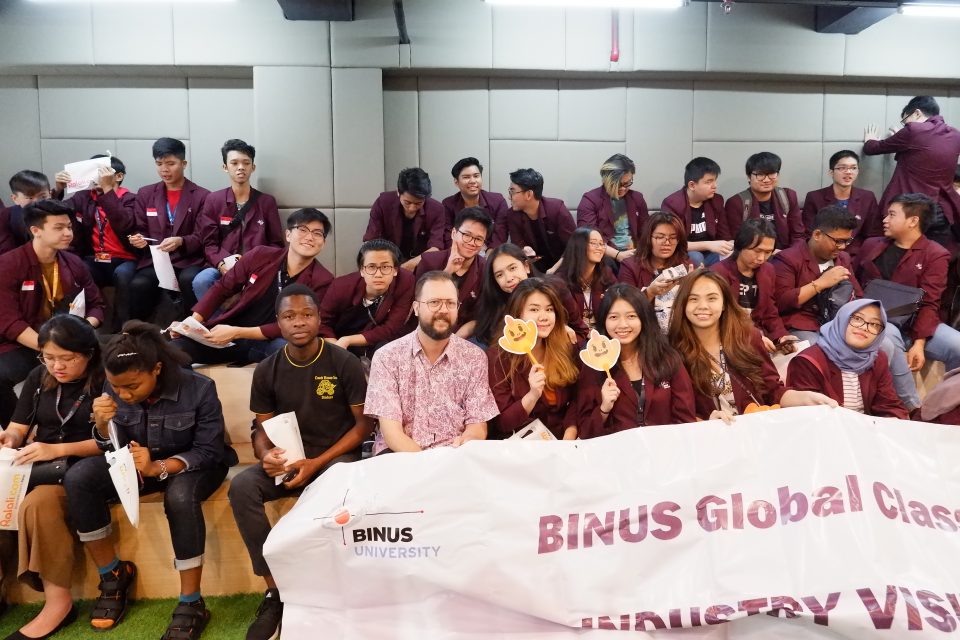An Interview with Michael Aaron Tuori of BINUS University, Deputy Head of Global Class – International Business Management Programme.
Michael Aaron Tuori, a first-generation MIT graduate who is passionate about economics, development, and academia, plays a central role in BINUS University’s efforts to establish world-class education in Indonesia. Mike teaches analytical and strategic classes and researches business strategy. As the Deputy Head of Global Class for the International Business Management programme, he is implementing practices that develop critical thinkers for Indonesia’s labour market. Here is our conversation with him…
Mike, what attracted you to Indonesia and BINUS University?
Indonesians are creative. I first came to Indonesia when I was doing my Master’s degree in International Development. I completed my research about informal recycling practices at Bandung landfills. Indonesians know how to mix things together to create something new. I found this striking in the youth culture as well; I remember seeing kids in Jogja combining basketball with breakdancing. Indonesians, while proud of their own culture, are open to other cultures as well. I was able to connect.
I started my Indonesian career at a startup in Jakarta after working for several years in research and industry in Malaysia and India. We were hiring fresh graduates from computer science and design programmes. BINUS graduates always turned out to be mature and professional. This is how I became interested in lecturing at BINUS. I have been with the university since 2015.
Why is Global Class an example of a world class programme?
In deciding the direction for Global Class International Business Programme, I have researched the characteristics of the best business schools around the world. I came to understand that we need a stronger academic foundation. Following examples from the U.S., I have introduced more theory, academic writing, and math skills in the first few semesters before the students tackle more complex analytical and practical issues later.
I recently conducted research on the top skills sought after by global companies in Indonesia, the biggest gap is critical thinking. We are trying to close this gap here at BINUS as part of our commitment to world-class quality. Small class sizes ensure students receive the guidance needed to acquire these skills. We have only around 30 students per batch so we can build a personal relationship with the students, address their individual issues, and counsel them along their academic journey.

How do you measure the success of the programme?
We used to have two main problems. One semester of study overseas is mandatory and includes a network of very selective universities. At first, our students were struggling academically during their overseas stay. On the other hand, we used to receive transfer requests. Now, our students are doing just as well overseas as they do at BINUS, and while they value their unique experience abroad, they consider the quality of education at BINUS on par.
I am happy to say that one of our students each year graduates with summa cum laude. BINUS graduates over 6.500 students annually, and only around 60 receive this distinction.
Our programmes are also becoming more popular with exchange students and we are receiving full degree applications from international students. This means our brand is growing in international recognition.
Why do you consider student centred programmes important?
Our students have a lot of say in what we do. Getting student feedback helps us with lecturer development. We consulted the students when developing the ethical guidelines for our lecturers. For instance, students criticised the practice of publicly sharing students’ grades. The Code of Conduct now governs issues such as privacy, fairness, and transparency. Our students now know that they can expect certain conduct from our lecturers.
Students are young individuals who need help with shaping their professional career. I spend a lot of time trying to understand their individual challenges and responding to student needs. I am a first-generation college graduate who was able to attend and excel at MIT with the guidance and mentoring from dedicated educators. I feel we need a similar approach in Indonesia, so that students feel respected and supported throughout their college experience.
What kind of student profile fits Global Class culture?
We implement strict selection criteria. During the interview I make sure the students share our values – that they have the English abilities, motivation, and intellectual capacity we need. The questions I ask seek to measure these things – are you passionate, motivated, and excited to be in Global Class?
Our next info session is on 15th December 2019 at our Alam Sutera campus. I invite families to come and learn more about our programme and the admissions process. I am excited to discuss how we can build a world-class programme together.
See: Binus School Simpang: A World-Class Community of Proud and Outstanding Achievers




